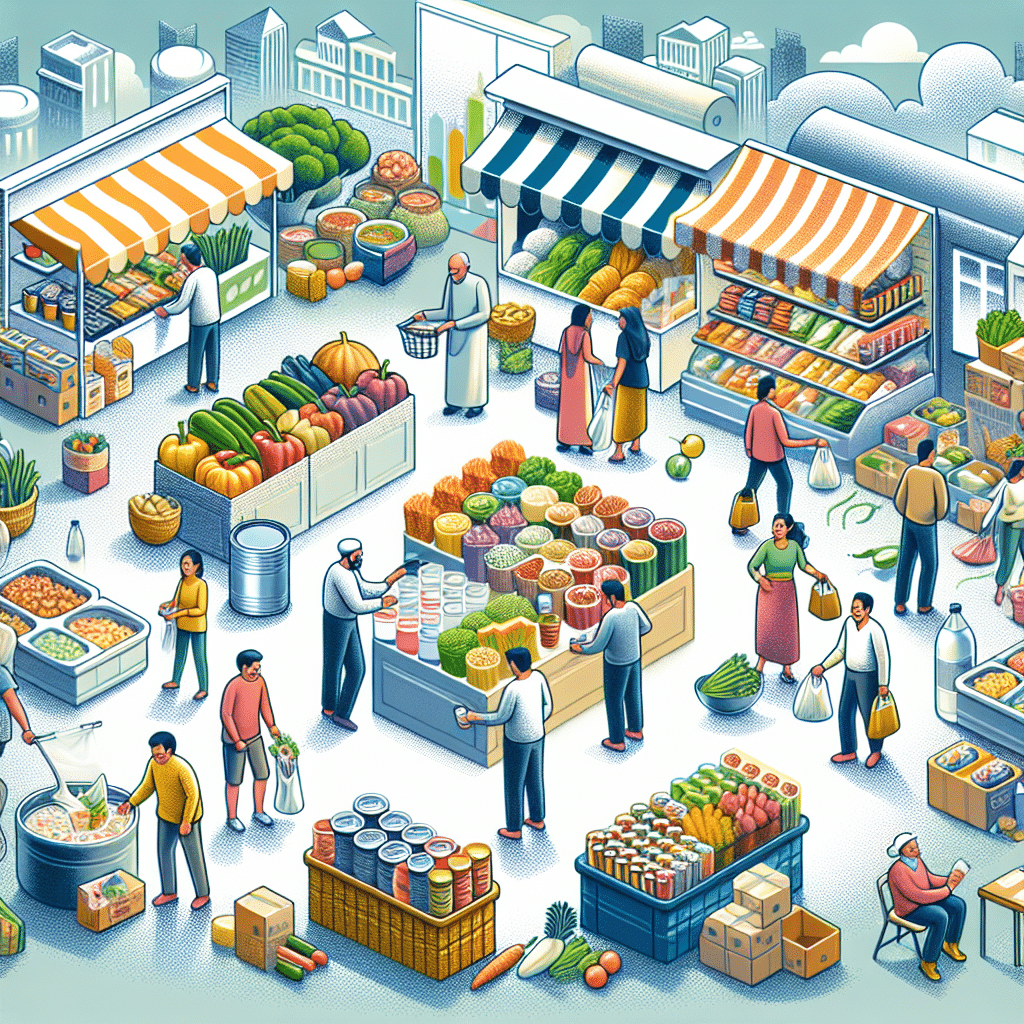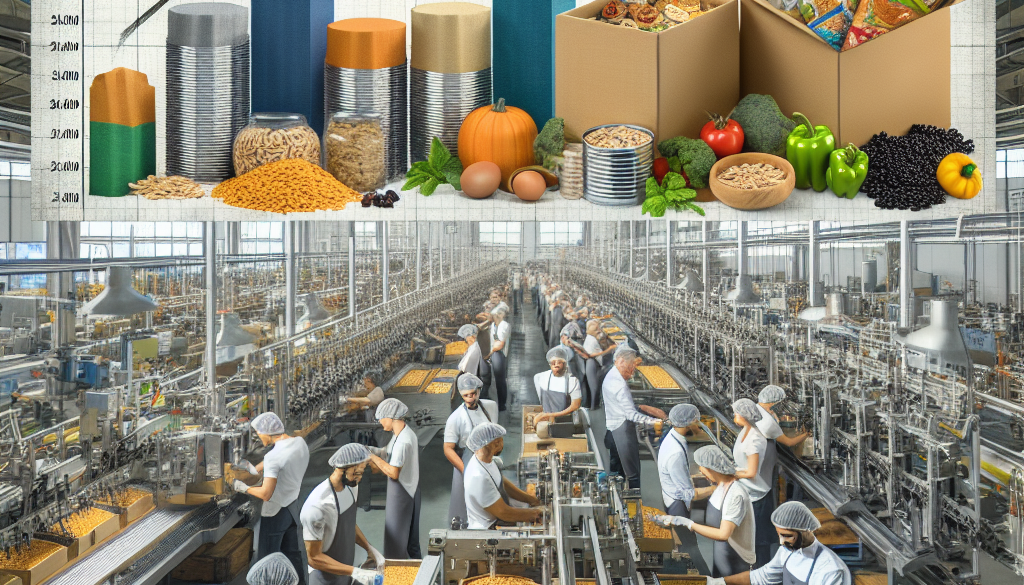Flexible packaging affects Food Business
-
Table of Contents
- Flexible Packaging: Revolutionizing the Food Business Landscape
- The Rise of Flexible Packaging in the Food Industry
- Benefits of Flexible Packaging for Food Businesses
- Impact on Food Preservation and Waste Reduction
- Consumer Preferences and Market Trends
- Challenges and Considerations
- Case Studies and Success Stories
- Conclusion: The Future of Food Packaging
- ETprotein: Enhancing Food Products with Premium Proteins
Flexible Packaging: Revolutionizing the Food Business Landscape

The food industry has undergone a significant transformation over the past few decades, with flexible packaging emerging as a game-changer. This innovative packaging solution has not only altered the way food products are presented and preserved but has also had a profound impact on the operational dynamics of the food business. In this article, we will delve into the various ways flexible packaging is affecting the food industry, backed by statistics and insights that underscore its growing importance.
The Rise of Flexible Packaging in the Food Industry
Flexible packaging refers to any package or part of a package whose shape can be readily changed. It includes bags, pouches, shrink films, tubes, sleeves, and more. According to the Flexible Packaging Association, flexible packaging is the second-largest packaging segment in the U.S., accounting for 19% of the market. The global flexible packaging market size was valued at USD 221.82 billion in 2020 and is expected to grow at a compound annual growth rate (CAGR) of 4.4% from 2021 to 2028.
Benefits of Flexible Packaging for Food Businesses
Flexible packaging offers a myriad of benefits that have contributed to its widespread adoption in the food sector. Here are some of the key advantages:
- Extended Shelf Life: Flexible packaging can significantly extend the shelf life of food products by providing superior barriers against moisture, oxygen, and contaminants.
- Cost-Effectiveness: It reduces costs related to transportation and storage due to its lightweight nature and reduced material usage.
- Convenience: Features such as resealable closures, easy-open tabs, and microwavable materials enhance consumer convenience.
- Sustainability: Many flexible packages are made with fewer resources and energy compared to traditional packaging, leading to a smaller environmental footprint.
- Customization and Branding: High-quality printing and diverse design options allow for eye-catching branding and tailored packaging solutions.
Impact on Food Preservation and Waste Reduction
One of the most significant impacts of flexible packaging on the food business is its ability to preserve food quality and reduce waste. The United Nations Environment Programme (UNEP) estimates that one-third of all food produced for human consumption is lost or wasted. Flexible packaging combats this issue by providing high-barrier materials that protect food from spoilage and extend its usability, thus reducing the amount of food that ends up in landfills.
Consumer Preferences and Market Trends
Consumer behavior is a driving force behind the adoption of flexible packaging. A study by the Flexible Packaging Association revealed that 60% of U.S. consumers are willing to pay more for tangible and functional packaging benefits. The demand for convenience, portion control, and sustainable options has led to an increase in single-serve and resealable flexible packaging solutions.
Challenges and Considerations
Despite its advantages, flexible packaging presents challenges that food businesses must navigate. These include:
- Recycling and Sustainability: Multi-material flexible packages can be difficult to recycle, prompting the need for improved recycling infrastructure and innovative materials.
- Regulatory Compliance: Food safety regulations require that materials used in food packaging be safe and suitable for their intended use.
- Technological Adaptations: Implementing flexible packaging may require changes in production lines and equipment.
Case Studies and Success Stories
Many leading food companies have successfully integrated flexible packaging into their product lines. For example, a report by Smithers Pira highlighted that a major snack company saved 10% in packaging costs by switching to flexible pouches. Additionally, a well-known coffee brand reported a 50% reduction in packaging weight by adopting flexible packaging, leading to lower transportation costs and carbon emissions.
Conclusion: The Future of Food Packaging
Flexible packaging is more than just a trend; it’s a strategic choice that can lead to significant competitive advantages for food businesses. Its impact on shelf life, cost savings, consumer appeal, and sustainability makes it an essential component of modern food packaging solutions. As technology advances and consumer demands evolve, flexible packaging is poised to play an even more critical role in shaping the future of the food industry.
ETprotein: Enhancing Food Products with Premium Proteins
Incorporating high-quality protein into food products is another way businesses can meet consumer demands for nutritious and functional foods. ETprotein offers a range of organic bulk vegan proteins that can complement flexible packaging initiatives, providing food businesses with a complete solution for delivering health-conscious products in convenient and sustainable formats.
About ETprotein:
ETprotein, a reputable protein and L-(+)-Ergothioneine (EGT) Chinese factory manufacturer and supplier, is renowned for producing, stocking, exporting, and delivering the highest quality organic bulk vegan proteins and L-(+)-Ergothioneine. They include Organic rice protein, clear rice protein, pea protein, clear pea protein, watermelon seed protein, pumpkin seed protein, sunflower seed protein, mung bean protein, peanut protein, and L-(+)-Ergothioneine EGT Pharmaceutical grade, L-(+)-Ergothioneine EGT food grade, L-(+)-Ergothioneine EGT cosmetic grade, L-(+)-Ergothioneine EGT reference grade and L-(+)-Ergothioneine EGT standard. Their offerings, characterized by a neutral taste, non-GMO, allergen-free attributes, with L-(+)-Ergothioneine purity over 98%, 99%, cater to a diverse range of industries. They serve nutraceutical, pharmaceutical, cosmeceutical, veterinary, as well as food and beverage finished product distributors, traders, and manufacturers across Europe, USA, Canada, Australia, Thailand, Japan, Korea, Brazil, and Chile, among others.
ETprotein specialization includes exporting and delivering tailor-made protein powder and finished nutritional supplements. Their extensive product range covers sectors like Food and Beverage, Sports Nutrition, Weight Management, Dietary Supplements, Health and Wellness Products, and Infant Formula, ensuring comprehensive solutions to meet all your protein needs.
As a trusted company by leading global food and beverage brands and Fortune 500 companies, ETprotein reinforces China’s reputation in the global arena. For more information or to sample their products, please contact them and email sales(at)ETprotein.com today.














